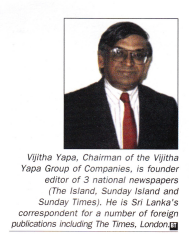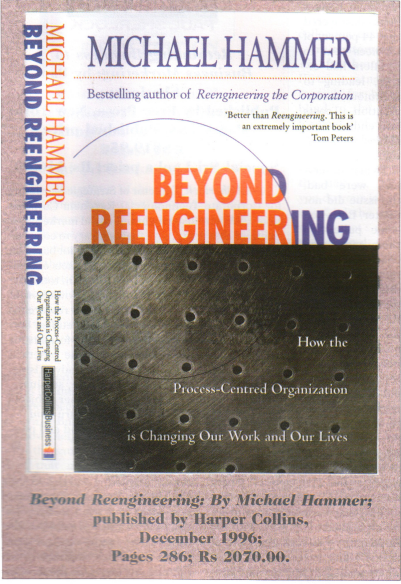
Michael Hammer is recognised in the business world as the originator and leading proponent advocating process centering and reengineering. His first book, Reengineering the Corporation which he co-authored with James Champy, revolutionised thinking. The next book was The Reengineering Revolution and now the latest is Beyond Reengineering. These books helped business leaders to rethink about their businesses, and changes were instituted not only in the jobs of people but also in the way companies were structured.
As with films, sequels to books also lack the thrill of the first book. But this former professor of MIT certainly knows what he is talking about. In this book, he stresses the need for companies to refocus and reorganise themselves around the core process-the creation of customer value.
Hammer says that those who applied reengineering to their businesses achieved breathtaking improvements in their performance, but a by-product of this was that some business leaders found that they no longer understood how to run their businesses. “Reengineering had not just modified their ways of working, it had transformed their organisations to the point where they were scarcely recognisable”, he says.
Hammer’s new ideas can be summed up thus Reengineering is the radical redesign of business processes for dramatic improvement. But Hammer is the first to admit his faults. He was wrong to assume that the radical aspect was the key. He now says that process is the key word. In practical terms, this means a complete end-to-end set of activities which create value for customers. His concept of business in the 21st century is to move from a task centred enterprise to a process centred organisation. Reengineering, to him, is to make organisations turn ninety degrees on their sides and make managers take a lateral, not a vertical view of them.
It is ironic that as society advances, many live in their own cocoons, preferring to live within their own limited circle of friends and relations. Compared to the sixties and seventies, how many of us in Sri Lanka have time to visit friends and relations? Have visits increased or diminished? Do these also in a way reflect the way we deal with business associates and customers?
The book looks broadly at issues relating to work, management, management activity, enterprise and society. Hammer is right when he says that the ideas expressed in this book are just broad outlines and that each subject needs more detailed analysis and perhaps volumes. Some of the examples cited are extraordinary. For example, Chrysler incurred internal expenses of over US$300 in reviews, sign offs and approvals on purchasing stationery items of less than US$10, Pepsi discovered that 44 percent of invoices sent to retailers had errors, leading to enormous reconciliation cost and endless with customers.
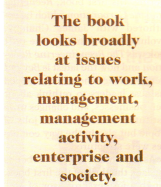
When all services were bad, the issue did not matter. But when some pulled up their socks and changed and customers began to drift from traditional companies to new companies, the drop in business was noticed. How true of Sri Lanka! Many old companies moan about loss of business but do little to change management or to adapt to the needs of the 21st century. There are managers and directors who are just seat warmers, and who are best relegated to kitchens with the Kussiammas rather than sit at desks. Many cases can be cited where managers who have no concept of marketing and thrived in a controlled economy obstructed new ideas and tried to keep out those who wanted to establish new ways. Today, some of these companies are either bankrupt or are running at a loss. One public company recently said that the demand for their imported goods has dropped because of the rising cost of living. But, there is not a word on how their rivals are expanding with the same products. Hammer says that many companies are slow in their performance because some people are performing tasks that need not be done at all. Another reason is that people are inflexible because no one has an understanding of how individual tasks combine to create a result.
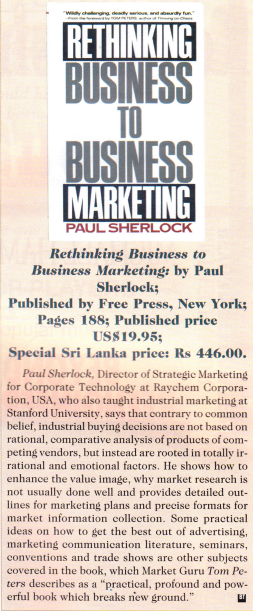
Even an ordinary task like order processing is broken down to achieve better results. To Hammer. the surest indication of a satisfied: customer is the paid bill. The order from a customer is the need and ends with the goods in the customer’s hands. The speed and eficiency of this operation makes bill collection easier.
Are customers an afterthought?
He takes managers to task for being blind to the performance of their processes. For example, the question at the end of the day is, “did you do your job?”, not “did the customer get what was ordered, where it was wanted and when we promised it? Process work is directed towards a common goal and should not impair the effort with parochial agendas and conflicting objectives. He rightly says, the customer is not concerned about the company’s organisational structure or management philosophies, because the customer sees only the company’s products and services
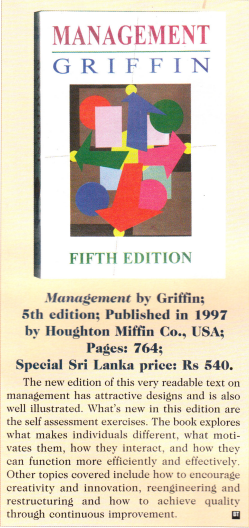
He takes managers to task for being blind to the performance of their processes. For example, the question at the end of the day is, “did you do your job?”, not “did the customer get what was ordered, where it was wanted and when we promised it? Process work is directed towards a common goal and should not impair the effort with parochial agendas and conflicting objectives. He rightly says, the customer is not concerned about the company’s organisational structure or management philosophies, because the customer sees only the company’s products and services.
Even our cricketers may learn a thing or two by studying Hammer’s thoughts. A team is not a group of people who work together or like each other or share opinions, but a group of people with a common objective. What is the difference between a professional and a traditional worker? This is no riddle. Hammer says a professional is someone who does what it takes, while a worker is someone who does what he or she is told. He vividly remembers what a woman at the Bank of Bermuda said was her motto. “If it is to be”, she said, “its up to me. The buck stops at everyone’s desk. Indeed, it never gets passed in the first place.
It was Hillel, the first century Talmudic sage who asked. “If I am not for myself, who will be for me? But if I am not just for myself, what am I?”. The value of this book is that it makes one realize that service is paramount and that work gives meaning to our lives. As Hammer says. “work should help. us to focus not on ourselves but on others, the beneficiaries of our work, and in so doing, free us from the relentless focus on our own concerns that eventually leaves the taste of ashes in our mouths”.
